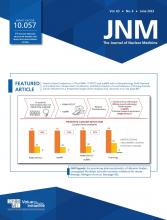Over the past year, SNMMI has implemented many new initiatives focused on putting the patient first. As SNMMI president, I have worked with our dedicated leadership, volunteers, and staff to develop programs to improve access to care, advocate for appropriate reimbursement, encourage scientific advances, and ensure quality and safety. The resulting achievements will help propel the growth of the field, ultimately benefiting our patients.
Among the goals most important to me in this past year has been to ensure that historically underserved populations, rural and urban, receive equitable imaging and treatment. Appropriate reimbursement is critical to ensuring that patients have access to cutting-edge nuclear medicine and molecular imaging innovations. If a radiopharmaceutical is not adequately reimbursed, providers may not offer procedures that utilize it—which in turn limits patient access.
SNMMI has partnered with the Council on Radionuclides and Radiopharmaceuticals and the Medical Imaging and Technology Alliance to develop and advance major bipartisan legislation, the Facilitating Innovative Nuclear Diagnostics (FIND) Act, which would require Medicare to appropriately reimburse for radiopharmaceuticals. Widespread efforts have been made to promote the legislation, including briefings with key congressional staff and continuing conversations with government agencies, insurance providers, and patient groups to advocate for proper reimbursement. More than 80 groups now support the legislation. To find out more, visit www.snmmi.org/FindAct.
In addition to the FIND Act, long-term efforts by the society with the Centers for Medicare and Medicaid Services (CMS) resulted this year in 2 critical wins: coverage of 18F-FDG PET for infection and inflammation and expansion of CMS coverage for nononcologic PET. Both advances will expand access to critical care for patients.
To further promote access to care, in March SNMMI hosted a successful summit on “Patient Access to and Health Disparities in Nuclear Medicine Procedures.” The meeting gathered representatives from major stakeholders in the nuclear medicine and health equity spaces who identified and addressed barriers that prevent patients from accessing high-quality nuclear medicine scans and therapies.
In the past year, we have seen notable scientific advances in nuclear medicine and molecular imaging that will significantly accelerate growth in the field. The society is raising awareness about new radiopharmaceutical therapies (177Lu-PSMA-617 and 177Lu-DOTATATE, for example) with medical professionals, providing education materials, developing appropriate use criteria, and hosting an annual Therapeutics Conference. The society launched a new Radiopharmaceutical Therapy portal that contains detailed information for nuclear medicine professionals, referring physicians, and patients. SNMMI also launched a consumer media campaign in the fall of 2021 to raise public awareness of what nuclear medicine is and what it can accomplish, reaching nearly a billion consumers in its first 6 months.
To encourage further advances in research, SNMMI approved the creation of 6 Cancer Cooperative Group Junior Faculty Mentorship Awards last year. These fellows will join the National Cancer Institute’s National Clinical Trials Network cooperative groups in helping to influence, design, and lead trials. In addition, a 177Lu Dosimetry Challenge was launched in early 2021, followed by a special JNM supplement published in December, with the ultimate goal of advancing the practice of personalized dosimetry.
Richard L. Wahl, MD
SNMMI recognizes that quality and safety are major concerns of patients and is constantly striving to ensure that patients receive the best care. Earlier in 2022 SNMMI created the Radiopharmaceutical Therapy Center of Excellence program to certify sites that meet strict regulatory, training, qualification, experience, and performance criteria for radiopharmaceutical therapy. The response from clinical sites throughout the country has been strong, with more than 30 applicants and 9 designated sites as of this writing. With this prestigious designation, institutions can assure patients, their families, referring physicians, and payers that rigorous procedures are in place and followed, supporting appropriate patient selection and optimal outcomes from radiopharmaceutical therapy. To gather research on targeted radiopharmaceutical therapies, the SNMMI Board of Directors approved development of the Radiopharmaceutical Therapy Registry in 2021. This registry monitors anonymized data from patients who received radiopharmaceutical therapies.
Growing and sustaining the nuclear medicine and molecular imaging workforce are essential for nuclear medicine and molecular imaging. As part of its Value Initiative, SNMMI created a Workforce Pipeline task force this year to bring young talent into the field. SNMMI is also taking an active role in refining multidisciplinary care pathways and is leading the way in defining the new role of the nuclear oncologist.
Looking toward the future, SNMMI initiated its Mars Shot fund this year to radically transform the nature of disease treatment, prevention, diagnosis, and prognosis using visionary nuclear medicine procedures, radiopharmaceutical therapies, and research projects. By supporting training pathways and fellowships, our hope is to allow nuclear medicine physicians to integrate into patient management teams as key members, rather than remaining as outlying suppliers of imaging and treatment.
We must always remember to put patients first. I remain committed to advancing the field of nuclear medicine and molecular imaging and look forward to the continued growth and fruition of the society’s efforts under the leadership of our incoming SNMMI president, Munir Ghesani, MD.
- © 2022 by the Society of Nuclear Medicine and Molecular Imaging.








